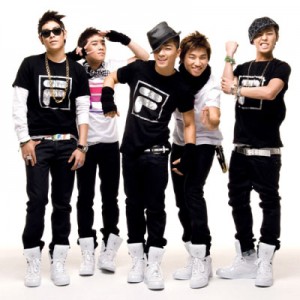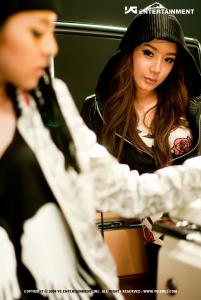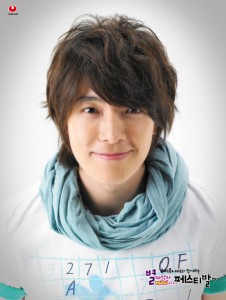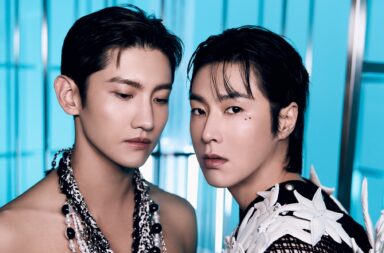 Welcome to another Roundtable!
Welcome to another Roundtable!
A couple of months ago, our writers participated in a roundtable centered around a topic asking which company of the Big 3 they would want to be a part of, and why. While we’ve looked at the strengths of each of these companies in the past, it is only fair that we also cover their weaknesses.
Last week, Korean news source Star Today published an article detailing thoughts on the weaknesses of each company. To summarize, the author was of the opinion that:
- SM‘s main weakness lies in being overly calculated and formulaic with its groups
- JYP‘s main weakness lies in being overly dependent on Park Jin-young as a composer/producer
- YG‘s main weakness lies in having overly limited and preferential media relations
Our question to our panel of writers this week is: What do you think are the main weaknesses of each of the companies in the Big 3? Do you agree with the author from the article above?
Amy: I think this article is half-on, half-off.
First, I’m not sure YG’s weakness is really a weakness. I understand the argument that as YG gets bigger and the market gets bigger, relying on one station (SBS) to promote doesn’t seem like it’s in YG’s best interest. But let’s be frank: even if YG gets bigger and even if the market is too big, there will always be room for a YG artist or product. The market will drop whatever it’s doing to watch and take a second to see what YG’s up to — that’s the kind of the market force YG has in the idol world today. And this really does work out better for the YG artists, that they promote primarily on one station: there’s not an oversaturation of one member/artist and it’s probably a healthier solution for the artists too.
The weakness with JYP I can understand as a weakness, but I also think that this is a weakness that’s prevalent in the other two companies as well: YG is overly reliant on Teddy and Teddy is in no way as good as JYP, so that’s even worse; SM is overly reliant on Yoo Young-jin, Kenzie, and its gaggle of Euro-producers. JYP probably stands out more because he has his own epic career. But, this is a huge liability to JYP Entertainment as a whole. It’s not enough that JYP has to stamp everything as his own, but everything coming out of JYP shares the same faults and strengths, so much that it’s almost formulaic. JYP is a huge narcissist and he really does need to let go of the reigns a little bit.
Salima: I agree about your take on YGE, Amy. Their being “reliant” on SBS isn’t a weakness. If it were a weakness then they’d branch out into other stations. I find it hard to believe that MBC and KBS aren’t on their toes waiting for YG artists to also participate on their programs. If anything, YG’s weakness is its over-reliance on Big Bang. Big Bang makes the most profit (by far) out of all the YG artists. What happens when you have scandals like Daesung and G-Dragon‘s scandals in the past, and the group is forced to disband? Who is going to be YG’s prime money maker? It’s a fragile position to be in.
In regards to JYPE, I absolutely positively agree that JYP’s oversaturation of production work is it’s weakest link. Amy, you mentioned that YGE is too dependent on Teddy and that’s worse than JYPE being reliant on JYP. I disagree. Yes, JYP’s production work is good and he’s been doing it for so long that no one cares to question it, but that’s exactly where his weakness lies. He’s so confident about his production and signature style that he doesn’t realize that he needs to CHANGE it! Switch it up a bit. Give me some hip-hop. Some heavy guitars. Some dubstep even? He’s set in his ways, which is detrimental. I think Teddy is confident but more maleable. He’s younger and open to what the new trends are, which make for some far out, evolving production. It’s like JYP’s old school vs. Teddy’s new school.
As for SM, their weakness is not only their rigidity, but also their image. The artists are great but the way they’ve been reported to be treating them in the past is a huge turn off. That’s in addition to their almost tangible feeling of being formulaic.
 Amy: My point was that all three companies are reliant on a very small group of in-house producers, so it’s not exactly a JYP-specific problem. But I think what DOES give JYP an edge is that he is very creative musically, even if the last two-three years have not been great years for him. Teddy is younger and is open to more changes, but Teddy at his best will never be as good as JYP is at his best. I don’t think anyone can argue this. As as young and experimental he could possibly be, Teddy’s work from years 2009-2012 are basically all the same thing. His work for Big Bang prior was much more alive and less the autotune, electropop mess it is now. 2NE1‘s “To Anyone” album — very Teddy-heavy — was basically one giant song to me.
Amy: My point was that all three companies are reliant on a very small group of in-house producers, so it’s not exactly a JYP-specific problem. But I think what DOES give JYP an edge is that he is very creative musically, even if the last two-three years have not been great years for him. Teddy is younger and is open to more changes, but Teddy at his best will never be as good as JYP is at his best. I don’t think anyone can argue this. As as young and experimental he could possibly be, Teddy’s work from years 2009-2012 are basically all the same thing. His work for Big Bang prior was much more alive and less the autotune, electropop mess it is now. 2NE1‘s “To Anyone” album — very Teddy-heavy — was basically one giant song to me.
Fatouma: On the topic of switching it up, I feel like Teddy’s slowly becoming a bit too repetitive with the works he’s been doing, especially for 2NE1, in the same way YYJ has been with some of his material in SM. This whole SMP style is generally expected from anything YYJ makes because that’s what he’s been sticking to lately, because it’s what’s gotten the best reception for him. Teddy has been playing it safe as well with clinging on to the mainstream, electro-pop sound. I was really glad to see that Teddy collaborated with Lydia Park for 2NE1’s “I Love You”, to some extent, and finally started to break from the standard electro-pop mold by mixing up electro-pop with different sounds, like trot. It’s nice to see composers experimenting with different sounds, but then again, JYP tried that with JJ Project‘s “Bounce” but it ended up falling flat on his face.
With weaknesses, I find that SM is formulaic, but I don’t find it as a weakness, at least from a business standpoint. They’ve managed to get their product down pat, with their training system and marketing of their idols. The only real weakness I see with SM is that they are too reliant on their fanbases. They seem too comforted with the fact that their fans are more than willing to accept and promote any material they release, regardless of quality. I think that’s because SM idols are marketed in a way that musicality isn’t the only reason why SM artists have so many fans, so even if most people dislike the music they churn out, their idols are still likeable. The over-exposure of SM idols in the entertainment sphere in general helps as well.
Ambika: With regards to JYP, I’m on the fence. I don’t find JYP’s involvement to be that much of a weakness in that, like Amy said, he does have some of that creative juice and experience that keeps different music coming. And even though he’s a clear presence in his groups’ tracks, it seems that the groups do have some sort of say as to whether they want the song. But at the same time, I can’t really name any recent hits from JYP. And when I say “hit,” I mean a song that was really well-liked by a large portion of fans. “Like This” perhaps comes close, but it’s not obvious.
With SM groups, they all seem to have this polish over them that keeps them in a level of their own. That seems like a weakness from a humanistic point of view, but their fans eat it up. While every fanbase has its crazy loons, it seems like those of SME groups have ones that even more enthusiastic and willing to be cause commotion as they fight for their oppas and unnies. And I think part of that is due to that carefully managed image and distinct personality that all members have. In some way, they all become popular, as if their personalities were carefully crafted for them. Also, SME seems to rely on these fanbases not just to eat up songs that aren’t always of top quality, but to buy those multiple versions of albums through attractive new covers, photos, photocards, what have you. While I’d like to call that formula a weakness, it does bring the money home.
For SM, I think a weakness might be how they handle concerts. SM groups are constantly having to churn out new songs to hold a concert per year (as SHINee and Super Junior both do), but there are only so many new songs or choreographies to perform that the area hasn’t seen before. Considering how other entertainment companies and groups are slowly branching out as well, it might get to the point where fans have to choose between SMTOWN, which came last year, or say, BEAST, who might be coming around for the first time in a while.
With YG, I do think that their limited media relations and appearances are a weakness in the sense that those artists miss out on those opportunities to show off their personalities on variety or talk shows. While Big Bang has participated a sufficient amount, 2NE1 would probably benefit from appearing on a show or two other than 2NE1TV. The Strong Heart YG Special showed that the girls can speak and have stories to share. It’s understandable that they get nervous, but I think they lose out on some fans because quite a large part of K-pop, as JYP and SM have observed and acted on, is personality and those interactions within and group and with others.
 Fatouma: With YG, I think their saving grace are truly their artists, with their natural talent and stage presence, more so Big Bang than 2NE1. Because of the lack of visibility of Big Bang and 2NE1 in the variety and other entertainment circuits, it can be more apparent that Big Bang and 2NE1 are liked for their musicality, than anything else. This can backfire depending if Big Bang and 2NE1 releases a terrible album or not, but I think we’ve gotten to the point where their fanbases are so large that it doesn’t really matter if their album is truly bad or not. But I do think the lack of Big Bang and 2NE1 on variety shows could hurt them in terms of relatability, especially for new fans. But with the existence of 2NE1 TV and occassionally, Big Bang TV, I think fans have a way to see a less commercialized version of Big Bang and 2NE1, that’s a lot more cost-effective for YG.
Fatouma: With YG, I think their saving grace are truly their artists, with their natural talent and stage presence, more so Big Bang than 2NE1. Because of the lack of visibility of Big Bang and 2NE1 in the variety and other entertainment circuits, it can be more apparent that Big Bang and 2NE1 are liked for their musicality, than anything else. This can backfire depending if Big Bang and 2NE1 releases a terrible album or not, but I think we’ve gotten to the point where their fanbases are so large that it doesn’t really matter if their album is truly bad or not. But I do think the lack of Big Bang and 2NE1 on variety shows could hurt them in terms of relatability, especially for new fans. But with the existence of 2NE1 TV and occassionally, Big Bang TV, I think fans have a way to see a less commercialized version of Big Bang and 2NE1, that’s a lot more cost-effective for YG.
YG’s main weakness could be the size of their roster, and I do feel that YG is a little too dependent on Big Bang, as the article states. But I think YG is getting a lot better at balancing Big Bang’s and 2NE1’s promotions well and I don’t think that it’s necessary to have a large roster, unless they want to have a bigger stake on the market. I think YG is handling this with his inclusion of SuPearls and another girl group rumoured to be debuting this year. So, it really depends if YG manages to repeat the success of Big Bang and 2NE1, but at the same time not replicate the groups.
Jasper: While I don’t consider YG’s particular reliance on SBS a weakness, I definitely consider YG’s relatively small pool of resources and their natural over-reliance on those resources to be a major one. I’ve touched on the topic before, but YG only has two idol groups in their roster. As attention-grabbing as those two idol groups are, YG’s potential profit is less than the profit of those companies with bigger rosters. Simply said, YG really lucked out with both Big Bang and 2NE1. YG’s reliance on their own artists, while bringing some unique flair, is a big gamble and not really thought out for the long run, since what happens after these artists go away?
Furthermore, I agree that YG’s reliance on Teddy is worse than JYPE being reliant on JYP. While he’s more willing to experiment, Teddy’s slowly becoming formulaic even with only two groups to invest himself with, and that even slightly contradicts YG’s unexpected image. Sure, he’s had better days, but JYP has managed to entertain through a fair number of groups for years and managed to differ his sound with each of them to the point I’ll be invested to see what he’s got next.
That being said though, I do think JYPE does rely on JYP too much, and I do think it is a major weakness. Besides the potential issues in having a repetitive sound, JYP seems to be a one-man show and can’t seem to multitask as effectively as other companies. He was only really able to invest in 2PM and Miss A when the Wonder Girls were shipped off to the States, and while I’m glad I’m finally realizing how truly wonderful the Wonder Girls are as they are JYP’s current focus, 2PM has spent a bit too much time in Japan and is long overdue for a comeback. Other companies with big rosters face this problem also, but I feel it is most evident and most detrimental to JYP.
And about SM, I agree with Fatouma in that their assured fanbase is the major factor of their weaknesses as a whole. With said fanbases buying their material regardless of quality due to sheer devotion, why would SM go through the trouble of making good music — which I believe SM is still very much capable of doing? And with such a perfected formula and process in training and marketing their idols to achieve this fanbase, SM’s predictability isn’t really a weakness — at least when it comes to profits.
Paloma: Although I may not be the biggest fan of JYP’s songs ever (neither do I have anything against them, I just don’t find them that appealing), I actually do think his creative involvement is positive. As Amy said, the three companies tend to rely on one main composer/producer, so if that a weakness in JYPE it would as well be a weakness in SM and YG. And what I find positive about the fact that JYP is the main producer in JYPE is that, well, he is the CEO. I mean, even if it’s only image-wise, doesn’t it make it look like JYPE is not so much of a money-making company as a music-making one? But yes, JYP perpetual presence is annoying; at least Teddy doesn’t do creepy cameos in 2NE1’s MVs.
I’m with Ambika about YG; while I don’t see so much of a problem in their preferential media relations, I see it in their limited variety appearances. I’m fully aware that they are trying to project the image of a company that relies mainly in the music, but sometimes YG as a company just comes out “cold”. I mean, it’s good that the Big Bang members expend their time composing instead of going to every variety show out there, but even when they try to get away from that image, they are still idols after all. And as such, it wouldn’t hurt them to do some more fanservice once in a while.
Since we all seem to agree that being formulaic is one of SM’s weak points, I would also like to add that SM just doesn’t seem to know how to manage their most talented idols. They are pretty good when it comes to visual members or with idols that do well at varieties, but when it comes to musically talented idols they just don’t know what to do. Maybe it has something to do with the fact that they don’t really encourage musical creativity from the idols themselves; they have tried with sub-units, but none of the idols under a SM group has ever released solo material aside from dramas OSTs (I think). Even in those cases, there’s always a tendency towards ballads — not that I have anything against ballads (ok, I do, but that’s out of the point). I would die to see Yesung or Taeyeon releasing an up-tempo rock song, for example, but I highly doubt that will ever happen. And I guess that’s also one of the reasons why they couldn’t manage artists that were basically based on their musical talent such as CSJH or Zhang Li-yin, because they are so rigid on their light-pop flashy-teasers system that they don’t really know how to exploit talent in any other way.
 Nabeela: For starters, I totally agree about JYP. The groups on his roster rely way, way, way too much on JYP’s own productivity, and cycle in an out of Korea and international promotions depending on his availability and promotions. And, in my opinion, it’s not so bad that this reliance on JYP affects the productivity, because at the end of the day JYP is still a big music figurehead that should be involved in what his artists are doing.
Nabeela: For starters, I totally agree about JYP. The groups on his roster rely way, way, way too much on JYP’s own productivity, and cycle in an out of Korea and international promotions depending on his availability and promotions. And, in my opinion, it’s not so bad that this reliance on JYP affects the productivity, because at the end of the day JYP is still a big music figurehead that should be involved in what his artists are doing.
Rather the fact that JYP steers a lot of the artistic control makes me question his taste and just how relevant it is to audiences right now. For example, 2PM was stuck in this dark, emo-phase for sometime a few years back during their early days sans-Jay, and everyone knows how long the Wonder Girls were stuck doing the retro look. Part of me thinks JYP has so much going on that he keeps reinventing the same concepts and looks for his groups just to string them along, even if they begin to loose their appeal. And, even then, some of those concepts are a bit dated and even reflect a lot of JYP’s personal taste, which let’s be honest here, is not everyone’s cup of tea.
Everyone and their mother knows that SME is perhaps the most predictable of the big three, but Paloma brings up a good point about SME also largely fails at managing some of their most talented idols. Unfortunately, I can’t help but see SME as the one that plays favorites the most, more especially with the artists that rake in the most money with endorsement contracts. I mean, if it’s one thing SM is good at selling, it’s an image, but they also do way too much of the monopolizing of image as well, and that means putting their prettiest, more marketable faces ahead of the actual talent they may have on their hands. In essence, it’s just a shame a really.
I will disagree about YG though. I’m no YG stan–God only knows how I curse this troll for overpriced merchandise and concert tickets and limited appearances–but I do think YG is a little smarter about his game. By keeping his idols out of the media as much as he can, he inversely creates more demand for them–the more you can’t have them, the more you want them type of psychology. For the most part, I don’t think YG has a minimal or limited number of connections elsewhere with in music and media. I just don’t think he uses them–he purposely limits the kind of exposure his idols get to create the idea that they are more exclusive. Which, while all the more annoying to deal with as a fan, is a smart business move. I don’t think it’s something that makes him look “cold,” per se, or that he is trying to protect the image of his company. He runs greater risk of damaging his image allowing his artists creative and, to some degree, more personal freedoms, however he still takes those risks. While I as a fan hate the fact that I can’t enjoy getting to know YG idols through variety and TV, that’s just how YG does his marketing, and so far its been extremely successful for him.
Young-ji: It’s rather interesting to read what our writers are quoting as weaknesses because to me, these factors allowed the big 3 to become what they are today. For instance, the reliance on one producer in each camp allowed them to brand their musical flavor, promotional and media relations strategy colored how the fans perceive each artist and the figure heads’ involvement or lack thereof, added the final touch that was needed to package a K-pop idol group.
Overall, while we can nitpick on what we perceive as strengths and weaknesses, which to me are all valid, I think it’s also worth mentioning a common weakness of the big three. It appears that not a single company has a long term strategy when it comes to the international market. Yes, there have been cross-over attempts, successful concerts, sponsorships and mainstream American TV appearances, but what’s their ultimate vision and what are they striving for? From someone who sincerely wishes for K-pop’s success, I’m a bit skeptical about the direction K-pop has taken during the last couple of years. Everybody wants a piece of the hallyu bandwagon, yet nobody seems to be working towards taking it to the next level. The formulas of the big three has trickled down to even the minor companies and we are left with an industry where fans constantly discuss “nugu” groups, as if that’s normal.
I hope that Papa SM, YG and JYP are all secretly brewing up the next generation of K-pop of idols that will take the world by the storm, but until then, I’ll see their current overseas strategy — at least in the Americas — as their biggest weakness.
 Maria: SM has a lot of artists to work with. For every rookie that debuts, there must be at least two or three others that won’t ever see the limelight and if you estimate what it takes to train them for several years, a debut to them (money-wise) is more of a loss. Add to that a long list of artists who need material for comebacks and you realize that the restless SM might have for each idol the attention span of a five year-old, thus the need to play it safe with a formula: it needs a stable ground to walk on. Image-wise, this is the main flaw to me. It doesn’t allow the groups to form an identity. The artists are asked to use the same pattern and their distinctive features are the ones that stray from algorithm. It’s like making them wear the same outfits, but the accessories set them apart. This is why I perceive most of their groups to have a style, a recognizable quality, but not an identity per se.
Maria: SM has a lot of artists to work with. For every rookie that debuts, there must be at least two or three others that won’t ever see the limelight and if you estimate what it takes to train them for several years, a debut to them (money-wise) is more of a loss. Add to that a long list of artists who need material for comebacks and you realize that the restless SM might have for each idol the attention span of a five year-old, thus the need to play it safe with a formula: it needs a stable ground to walk on. Image-wise, this is the main flaw to me. It doesn’t allow the groups to form an identity. The artists are asked to use the same pattern and their distinctive features are the ones that stray from algorithm. It’s like making them wear the same outfits, but the accessories set them apart. This is why I perceive most of their groups to have a style, a recognizable quality, but not an identity per se.
YG is on the other extreme, going overboard sometimes in trying to craft a unique identity of a group, easily detectable with 2NE1 and Big Bang, who receive most of the attention. And I agree with the general opinion, having only two main idol groups is risky and they need to debut from time to time some other group. JYP to me is the most balanced, having both talented people and a specific image for his entertainers. The main flaw would be to me the selection of members. Not only did the company miss on solid artists before, but the groups tend to have either big discrepancies between the members or be a flat line (Miss A is made of good singers but they’re all on the same level and sometimes ends up having no spice).
The weaknesses are just the other side of the strengths: SMent’s formulaic releases are also the result of well-trained and extremely polished artists; YG’s small roster allows its idols to develop much faster and use all the resources and efforts of the company for themselves, while JYP has the advantage of a unique style and a bunch of talented individuals. As with the musical style, yes, a hand of producers or only one can prove to be bothersome and repetitive, but I’ll side with Young-ji on this one: it constitutes altogether the distinctive appeal of each company.
Nicholas: My problem with YG is how their greatest strength (the music being a cut above others, long promo cycles worth waiting for) is also the very same thing that could do them in. Over the years, it has become very obvious their success has been driven by one thing, an edgy, dance inspired sound, with two groups being at the forefront of it. Granted it is different, and they do own the field in that aspect, but one can only see it last as long as the genre is cool in K-pop.
JYP on the other hand, do have a sound that while can be pegged down to a company, does vary genre wise. Being run by a man who does love music and has a good grasp on pop means that for the most part enjoyable hits are guaranteed. How many other producers can claim to have a track record of songs that sell to all ages with such a varied mix of artistes, including himself? On the other hand, this also means that JYP is very much at the mercy of this particular man’s vision and his whims. So for every stroke of genius (like that uber hit Nobody), you also have dumb moves (like playing that song to infinity). And yes geniuses do have off days. You could not call Touch a better follow up than say, Good Bye Baby.
SM is very much a company for the populists. While purists would scream at how a company could so effectively streamline the music and artiste making processes, they’re turning music into more of a synthesized product than some thing out of inspiration. This is something that is off-putting and always serves as a lightning rod for many a music crtitic. On the other hand, by making a music an objective thing, that means that some things are guaranteed like decent abilities with singing covers, and songs that sound good to most ears. Problem is the whole thing is so not music in many ways, and yes, the Yoo Young-jin principles of sounding good above musical principles does not fly with some. Oh, and the bad press of artistes leaving SM in a cloud is just really bad PR.
 Subi: A company’s strength and weakness is dependent on its ability to turn a profit and while a lot of the strengths and weaknesses that we’re identifying are valid, many of these “strengths” or “weaknesses” neither encourage nor discourage the exchange and generation of capital. As far as which company will last the longest, I think SM and YG have quite the life line but when it comes down to a company, as a company that delivers K-pop, then SM takes the cake in my book. SM Entertainment established everything we know about K-pop and they stick to a formula, which, at the end of the day, is the very reason why people turn to K-pop in the first place. You can argue that YG gives them run for their money but besides their business plan and strategy (which is admittedly, a huge component), there is little about YG, especially musically, that is pure K-pop. In fact, YG’s appeal, especially among international fans, is that it has a very Western musical pallette. And yet, I wouldn’t label either company as one that will create the most fulfilling products. It’s pop. At the end of the day, it’s frivolous. It’s meant to be so and it’s precisely why we enjoy it. And these companies, thrive off it. It’s not meant to be fulfilling but that’s okay. If it weren’t, none of us would be here.
Subi: A company’s strength and weakness is dependent on its ability to turn a profit and while a lot of the strengths and weaknesses that we’re identifying are valid, many of these “strengths” or “weaknesses” neither encourage nor discourage the exchange and generation of capital. As far as which company will last the longest, I think SM and YG have quite the life line but when it comes down to a company, as a company that delivers K-pop, then SM takes the cake in my book. SM Entertainment established everything we know about K-pop and they stick to a formula, which, at the end of the day, is the very reason why people turn to K-pop in the first place. You can argue that YG gives them run for their money but besides their business plan and strategy (which is admittedly, a huge component), there is little about YG, especially musically, that is pure K-pop. In fact, YG’s appeal, especially among international fans, is that it has a very Western musical pallette. And yet, I wouldn’t label either company as one that will create the most fulfilling products. It’s pop. At the end of the day, it’s frivolous. It’s meant to be so and it’s precisely why we enjoy it. And these companies, thrive off it. It’s not meant to be fulfilling but that’s okay. If it weren’t, none of us would be here.
But going back to something Young Ji said about these companies lacking a global strategy and the question of which of these companies will have the greatest impact on an international market. I’m going to make a bold claim: K-pop will never be global and as a result, none of these companies will really ever impact the global market. Lee Soo Man has stated that he thinks the Western market is obsolete and with SM Entertainment’s strategy with EXO, I can see the beginnings of a serious attempt at creating “the East,” a cultural and social brand in opposition to “the West.” And while this may be for several reasons, I think this is because SM has caught onto something that may be in the back of YG and JYP’s heads as well. In order to be global, you need to sacrifice the Korean in K-pop. Everything about the genre is rooted in the socio-cultural make up of Korea and if you want to be global, then that means losing as much excluivity as possible, and if we’ve learned one thing about K-pop is how exclusive it is. And I don’t think that’s something these companies, or the brand, is willing to trade on both now and if not ever, then for a very, very long time.
Johnelle: I think SM’s fatal flaw it that they’re too complacent. Yes, they’re the biggest and baddest K-pop company around, but because the model which they built is so successful it seems as if they are just going to stick to it forever with no real plans for changing anything up moving forward. Which is why I agree that SM is too calculative and formulaic–there have been gems here and there from their artists, but it seems the more popular the artists get, the more stale and calculated their material. It’s totally a case of ‘if it isn’t broke, don’t fix it,’ but you know eventually it’s gonna break and I wish SM would be more innovative and proactive. SM also totally plays favorites with its more popular idols–heaping on the work to the point of exhaustion. With their might, I would think they would help the less popular ones get themselves out there more whether it be acting, emceeing, singing, or appearing on variety shows. They have a great talent pool with tons of idols and trainees and I think that they really do not utilize all the talent that they have efficiently. Another flaw I see in SM is the choke hold they have on their artists’ images. I totally understand why they’re like that because they need to protect the artists’ image, but it makes them seem so robotic at times in interviews, etc. where everything asked is pre-approved and pre-scripted. It makes me feel that of all the idols out there, we know the least about the true nature of SM artists.
As for JYP, their artists seem more ‘real’ to me–like they’re more themselves and natural in interviews, etc. and not so much always their perfect idol ‘image.’ Which in turn might not always be a good thing as scandals occur and of the Big 3, I would say that JYP is the worst at Public Relations control–we all know what a debacle the whole Jay Park and 2PM issue was and what made it worse was several missteps by JYP in handling the situation. I would also say that JYP is even worse than SM in helping to get their less popular idol groups/members gigs outside of their group activities. The perfect example of this is 2AM— I sincerely believe that if it wasn’t for Jo Kwon kkab-ing himself out on variety shows to finally gain himself and in turn 2AM some recognition, 2AM wouldn’t be as popular as they are today. I agree that the reliance on a small pool of writers/producers is a problem for all K-pop companies–it just seems more prevalent in JYP because of JYP himself being so popular as an entertainer himself and the main songwriter for his company and of course his infamous JYP shout out/whisper in every song. And while I’m totally a fan of having variety and innovation, I also understand that an idol group’s work must still be in some way similar or relevant to what fans know/want of them. A prime example of innovation maybe going awry recently is Beast’s “Beautiful Night” and the debate over how beastly the change was for that song where some fans loved it while others totally hated it. Whereas SM is too reliant on their model, I think that JYP doesn’t have a model and has been mostly lucky in their successes. I think JYP’s biggest flaw is poor management and planning.
 As for YG, they’re perfect right? Kidding… I agree with what many others said that YG’s relationship with SBS is a double edged sword, but not really their weakest link. In a way it’s great because due to their relationship with SBS they’re given the opportunity to plan out great comeback stages and special appearances on SBS’ shows like Running Man, but it also limits their appearance on other stations and in turn its shows. It’s good in a way because their idols aren’t being overworked by having to do so many performances and variety shows, but it also is a missed opportunity for their idols that would do great on other shows like Seungri. So far their ‘less is more’ strategies have been working, but I wonder how much longer it will continue to. I agree that their reliance on Big Bang is risky–to have 70% of your income coming in from one source is ridiculous. Just think what might have happened if last year things had turned out worse for Daesung and G-Dragon, it could have crippled the company enormously. YG has the least amount of idols and trainees to manage and in a way it has been working for them–to focus all their efforts on one group’s comeback at a time, but in order for the company to grow, they’ll also need to grow their artist base. YG did this slowly with the introduction of 2NE1 in 2009, their upcoming boy and girl groups and their latest acquisition of Su-Pearls, but I think that YG is too slow in doing things. I’m all for a carefully planned out debut, but YG just takes too long. I can see them having to be like that when they were a smaller company, but with their standing now they should be able to coordinate more talent efficiently at the same time. YG is also known for pushing back release dates and comebacks ALL THE TIME. I would have to say that YG’s biggest flaw is that they take too long to do things.
As for YG, they’re perfect right? Kidding… I agree with what many others said that YG’s relationship with SBS is a double edged sword, but not really their weakest link. In a way it’s great because due to their relationship with SBS they’re given the opportunity to plan out great comeback stages and special appearances on SBS’ shows like Running Man, but it also limits their appearance on other stations and in turn its shows. It’s good in a way because their idols aren’t being overworked by having to do so many performances and variety shows, but it also is a missed opportunity for their idols that would do great on other shows like Seungri. So far their ‘less is more’ strategies have been working, but I wonder how much longer it will continue to. I agree that their reliance on Big Bang is risky–to have 70% of your income coming in from one source is ridiculous. Just think what might have happened if last year things had turned out worse for Daesung and G-Dragon, it could have crippled the company enormously. YG has the least amount of idols and trainees to manage and in a way it has been working for them–to focus all their efforts on one group’s comeback at a time, but in order for the company to grow, they’ll also need to grow their artist base. YG did this slowly with the introduction of 2NE1 in 2009, their upcoming boy and girl groups and their latest acquisition of Su-Pearls, but I think that YG is too slow in doing things. I’m all for a carefully planned out debut, but YG just takes too long. I can see them having to be like that when they were a smaller company, but with their standing now they should be able to coordinate more talent efficiently at the same time. YG is also known for pushing back release dates and comebacks ALL THE TIME. I would have to say that YG’s biggest flaw is that they take too long to do things.
Amy: Just to take this to the next step: in terms of longevity (and thus taking into consideration all aspects of the company), which of the three companies do you think is going to last the longest, put out the most fulfilling products, and make the biggest impact on both the Korean market and the international one?
 Nicholas: SM, simply because of the money and how they can make their fan bases so rabid. Plus what I call unsophisticated and simple music, is others’ perfectly acceptable pop!
Nicholas: SM, simply because of the money and how they can make their fan bases so rabid. Plus what I call unsophisticated and simple music, is others’ perfectly acceptable pop!
Salima: YG. They’re the only ones with a legitimate chance at owning overseas success. (My heart wants to say JYP so bad.)
Jasper: SM; they’ve been perfecting their system for years, slightly tweaking it here and there to adapt to the times, and as long as the masses still accept them — which I’m almost certain they will, they’re going to be here in the long run.
Paloma: I’m gonna go with SM too, probably not music-wise, but none of the others has managed to get a brand status like SM has.
Maria: SM definitely if we talk about longevity. When I first started listening to K-pop, SM gave me the notion of what the genre was made of, while I tended to look at YG as the exception and at JYP as the improved version of it. As for the global market, I think the biggest change for the Korean artists to succeed is to debut without the K-pop label, just as individuals relying on their music, not on the trend they are part of — and companies won’t ever encourage that.
Fatouma: SM, because of they’ve become more of a brand than a company now. I don’t think that the SM brand is all too dependent on the artists, but it’s own separate entity that can be applied to any group of SM’s choosing, thanks to SM’s great marketing.
Ambika: Most definitely SM because they’re lifting the standard of idol groups by not just having groups with good music (when they try) and strong performances but well-rounded entertainers that can leave an impact not just within K-pop, but in other areas of entertainment as well. And fans like seeing or knowing that the group they like has such talented members or can pop out a witty statement in any situation.
(Star News; images via SBS, JYP Entertainment, YG Entertainment, Marie Claire)


